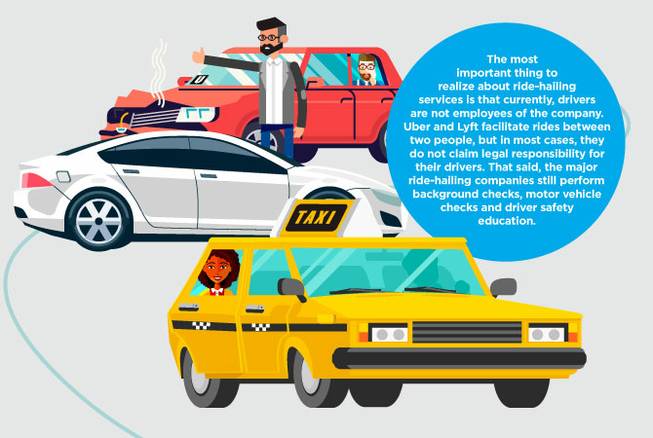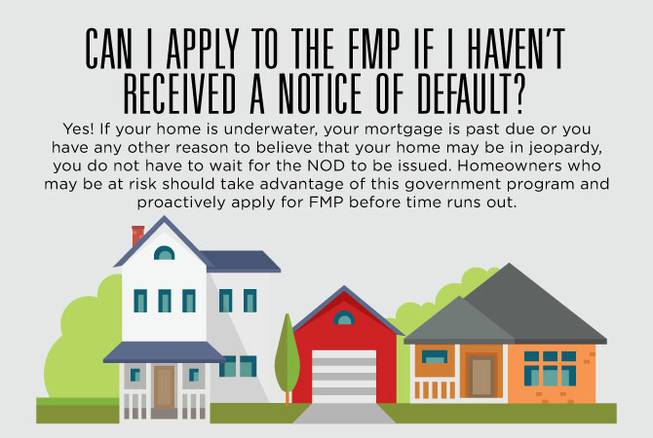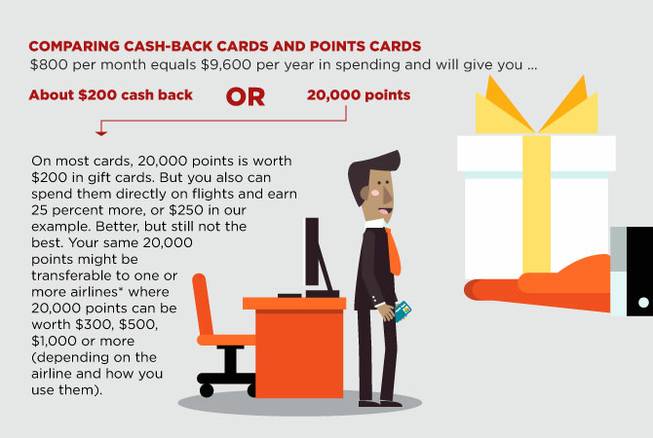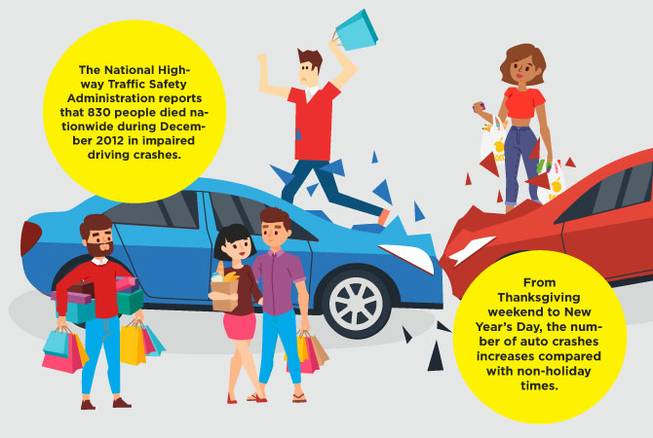
As ride-hailing services increase in popularity across the Las Vegas Valley, so do consumers’ questions about liability in the event of an accident.
These types of accidents can be complicated, and the liability can drastically change depending on the circumstances. Additionally, accidents involving a taxi service can be tricky.
Here’s what you need to know if you’re involved in an accident with a rideshare or a taxi.
Rideshares (such as Uber and Lyft)
The most important thing to realize about ride-hailing services is that currently, drivers are not employees of the company. Uber and Lyft facilitate rides between two people, but in most cases, they do not claim legal responsibility for their drivers.
That said, the major ride-hailing companies still perform background checks, motor vehicle checks and driver safety education. In addition, both Uber and Lyft offer $1 million liability insurance (similar to commercial carrier insurance), but there are limitations as to when this policy applies and whom it covers.
Additionally, claims may be fought by the rideshare’s insurance company, regardless of the driver’s fault in the accident. Much like a collision between two ordinary drivers, it’s customary for all parties to deny liability right from the start.
Insurance claims following an accident can be made against the driver’s personal auto insurance, which is where things can get complicated. Personal auto insurance typically does not cover anyone while they’re using their car for commercial purposes. Driving for Uber or Lyft is specifically that: The driver is using the car to conduct business. There have even been reports that insurance companies have canceled policies specifically because they found out the car was being used for commercial ridesharing.
If you’re a passenger in a covered vehicle, or you’re hit by a ridesharing vehicle that’s “in service,” you should be covered by the company’s policy. If you’re hurt in a collision with a driver who’s “off the clock,” that driver’s insurance company should be responsible but quite often denies initial claims.
It can get even more complicated if you’re a passenger injured by a driver who was being reckless, or you’re hit by a reckless driver who was “in service.” In theory, the rideshare’s insurance kicked in the moment the driver went into service (turned on the app). However, because the driver is considered an independent contractor, the company can deny claims that occur because of the driver’s recklessness.
Under that circumstance, if the passenger (or anyone hit by the reckless driver) suffers an injury as result of the driver’s recklessness, it can fall to the driver’s personal auto insurance to pay for the claim. However, most personal insurance policies exclude coverage if the driver was acting for profit at the time of the accident.
As a protective measure, some rideshare drivers might decide to get commercial insurance or rideshare insurance. It’s strongly recommended that anyone driving for Uber or Lyft in Las Vegas carry one of these types of insurance, but neither are required by the companies.
Taxis
In Nevada, taxi drivers are required to have common carrier insurance, which can cover the passenger, driver and a third party in the event of an accident. Because taxi companies are considered transportation companies, whereas ride-hailing companies are considered technology platforms, the taxi company often can be deemed liable in the event of an accident. However, proving liability can be complicated, depending on the individual taxi company.
In communities outside of Las Vegas, some taxi drivers own their cars, which usually leaves the driver responsible for damages. Some taxi drivers rent their cars from the taxi cab company, which may mean both the company and the driver can be held responsible. Other taxi companies own the cars and simply hire drivers, which means the company is usually liable.
Regardless, every taxi driver is required to have commercial carrier insurance, which applies whether or not they’re carrying a passenger. A ride-hailing company’s liability coverage only acts as commercial carrier insurance if there’s a passenger in the car.
If you’re injured in an accident caused by a rideshare driver or taxi …
Injury accidents in Las Vegas are complicated, and they can get more complicated when you’ve been injured by someone operating as a professional driver.
As noted above, when injuries are caused by Uber and Lyft drivers, insurance coverage depends on whether or not the rideshare driver was driving for the company at the time. It can be a nightmare sorting out liability and which insurance company (or individual) is responsible for covering your claims.
In a taxi situation, the driver always has commercial carrier insurance, in addition to the corporate policies in place specifically to limit the taxi company’s liability. Generally speaking, it’s easier to sort out the damages in these cases, but corporate insurance carriers also tend to deny claims.
In all cases where a citizen is injured by an individual acting as an agent of a company, it’s strongly encouraged that the injured person seek professional counsel.
Whether you’re a passenger injured while riding in an Uber, a pedestrian or cyclist who was hit by a Lyft, or a driver who was crashed into by a taxi, UPS truck or Domino’s pizza driver, companies all have one thing in common: They have teams of lawyers in place to ensure the company pays out as little as possible. If you’re ever in this situation, hire your own lawyer.







